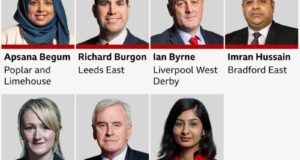 Theresa May has vowed to maintain peace and stability in Northern Irelanddespite fears that Britain’s vote to leave the EU will lead to the creation of a “hard border” with the Irish Republic.
Theresa May has vowed to maintain peace and stability in Northern Irelanddespite fears that Britain’s vote to leave the EU will lead to the creation of a “hard border” with the Irish Republic.
On her first visit to the province as prime minister, May tried to assuage concerns about a fortified frontier between Northern Ireland and the Republic of Ireland.
May, while campaigning for a remain vote as home secretary during the referendum campaign, had said it was inconceivable that border arrangements between the two could remain unchanged in the event of a Brexit vote.
Speaking in Belfast on Monday, the prime minister said: “No one wants a return to the border of the past.” May was referring to the state of the border during the Troubles, when hundreds of rural roads were blocked by security barriers and there were armed vehicle checkpoints, and permanent border posts manned by police and British troops.
May described her talks with the deputy first minister, Martin McGuinness of Sinn Féin, and Arlene Foster, the first minister and Democratic Unionist party leader, as “very constructive, positive”.
“What we do want to do is to find a way through this that is going to work and deliver a practical solution for everybody – as part of the work that we are doing to ensure that we make a success of the United Kingdom leaving the European Union – and that we come out of this with a deal which is in the best interests of the whole of the United Kingdom,” she said.
Her 90-minute meeting with the leaders of the Northern Ireland executivecoincided with a legal challenge being mounted by a coalition of pro-EU human rights and community groups in the province. They are attempting to overturn the Brexit vote so the region can remain in the EU.
However, May repeated her assertion on entering Downing Street that her government will begin the process of leaving the EU.
“Brexit means Brexit, but we will be making a success of it and I am clear that the Northern Ireland executive and the other devolved governments will be involved in our discussions as we set forward the UK position,” she said.
McGuinness said he told the prime minister that in terms of Brexit, there was “no good news for the people of the north of Ireland”.
On Europe, McGuinness said he, rather than the pro-Brexit Foster, spoke for the majority of people – “unionists, nationalists and republicans” – who voted to remain in the EU. In the referendum on 23 June, 56% of those who voted in Northern Ireland wanted to stay in the EU.
Foster said she was delighted that May regarded Northern Ireland as a strategic part of the United Kingdom. “No one wants to see the borders of the 70s, 80s, 90s [again],” she said.
The first minister went on to say she would object to any special restrictions being imposed on Northern Irish citizens travelling to other parts of the UK.
“There must be no internal borders within the United Kingdom. She [May] responded positively to that. There will be no internal borders in the United Kingdom,” Foster said.
Foster rejected McGuinness’s claim to speak for the majority of people when it came to the EU. She said the UK as a whole had voted to leave the EU and that this would have to be respected.
On Tuesday, May will hold further talks on the implications of the Brexit vote for the island of Ireland when she meets the taoiseach, Enda Kenny, in London.
 Weekly Bangla Mirror | Bangla Mirror, Bangladeshi news in UK, bangla mirror news
Weekly Bangla Mirror | Bangla Mirror, Bangladeshi news in UK, bangla mirror news







